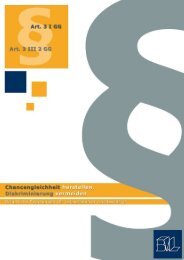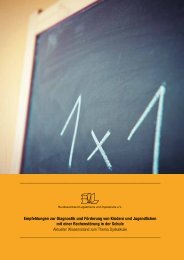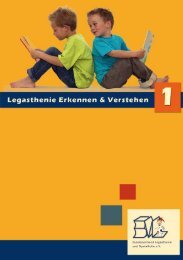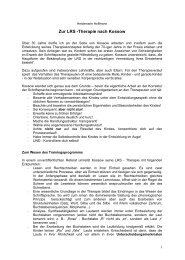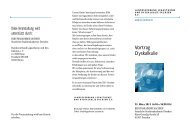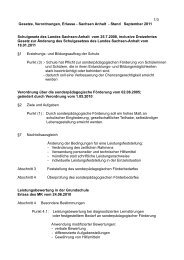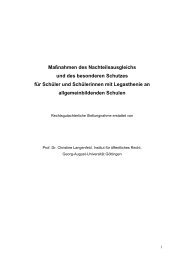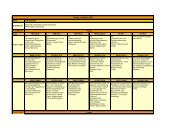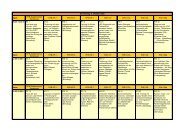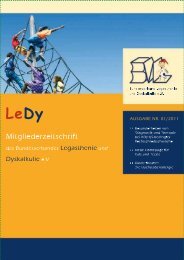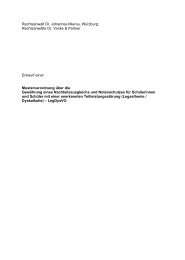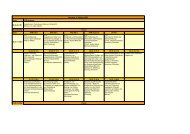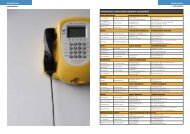Abstractband zum 16. Kongress des Bundesverbandes Legasthenie
Abstractband zum 16. Kongress des Bundesverbandes Legasthenie
Abstractband zum 16. Kongress des Bundesverbandes Legasthenie
Sie wollen auch ein ePaper? Erhöhen Sie die Reichweite Ihrer Titel.
YUMPU macht aus Druck-PDFs automatisch weboptimierte ePaper, die Google liebt.
<strong>16.</strong> <strong>Kongress</strong> <strong>des</strong> Bun<strong>des</strong>verban<strong>des</strong> <strong>Legasthenie</strong> <strong>Abstractband</strong><br />
Im aktuellen Vortrag werden die bisherigen Ergebnisse vom Kindergarten bis zur ersten<br />
Klasse präsentiert und diskutiert. Diese Studie wird durch das Bun<strong>des</strong>ministerium für<br />
Bildung und Forschung gefördert.<br />
Korrespondenzautor:<br />
Katharina Bublath<br />
katharina.bublath@med.uni-muenchen.de<br />
089 5160 5927<br />
How does learning to read and spell alter brain functions? -A longitudinal study<br />
from preschool to the end of the second grade<br />
Katharina Bublath (1), Jürgen Bartling (1), Günther Thomé (2), Gerd Schulte-Körne (1)<br />
(1) Klinik und Poliklinik für Kinder- und Jugendpsychiatrie, Psychosomatik und Psychotherapie, Klinikum<br />
der Universität München, München, Deutschland<br />
(2) Johann Wolfgang Goethe-Universität Frankfurt, Institut für deutsche Sprache und Literatur 1, Frankfurt,<br />
Deutschland<br />
To detect early neurophysiological differences between dyslexic and unimpaired children<br />
longitudinal studies are needed to investigate alterations of the brain functions during<br />
reading acquisition. In a previous study Maurer et al. (2007) found different event related<br />
potentials (ERP) between poor and good readers during an implicit reading task already<br />
in the first two years of school.<br />
The present study examines the neurophysiological correlates to an explicit reading task<br />
of children with or without a familial risk for dyslexia. They participate from preschool until<br />
second grade every half year. During an ERP-recording all children see either a word<br />
or a picture followed by a spoken word. By pressing a button they decide if the visual<br />
and auditory stimuli are congruent or incongruent. ERPs to the visual event and to the<br />
matching task are analysed.<br />
The previous results from the first assessment points will be presented and discussed.<br />
Literatur:<br />
Maurer, U., Brem, S., Bucher, K., Kranz, F., Benz, R., Steinhausen, H.-C., et al. (2007).<br />
Impaired tuning of a fast occipito-temporal response for print in dyslexic children learning<br />
to read. Brain: 130,. 3200-3210.<br />
Korrespondenzautor:<br />
Katharina Bublath<br />
katharina.bublath@med.uni-muenchen.de<br />
089 5160 5927<br />
15



